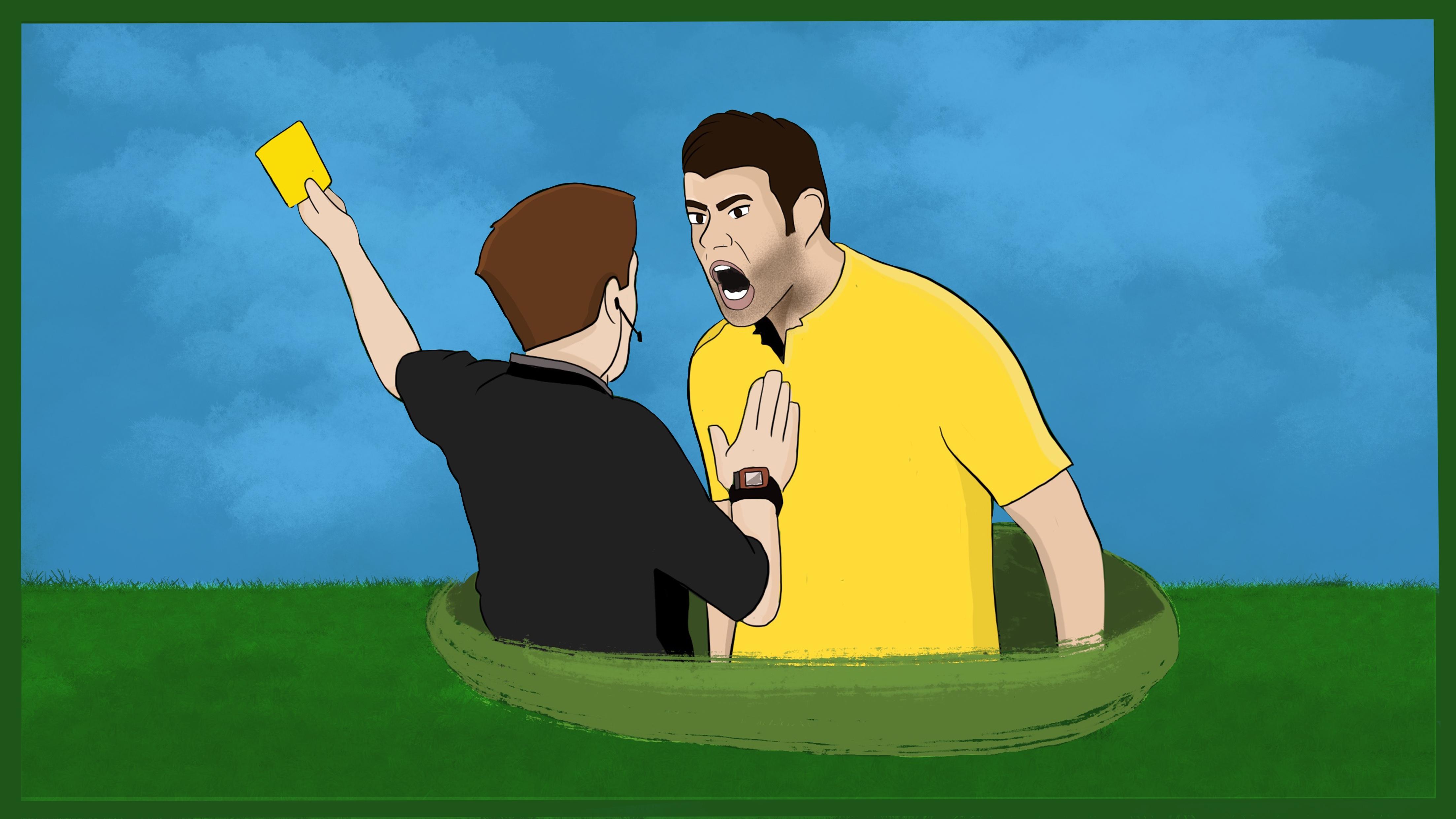Referees of the Ryerson community tell us about their experiences while officiating
By Jonathan Bradley
Illustration by Therese Sevilla
Iremember wearing the black shirt and shorts, the badge, and the whistle with pride. I worked as an entry-level referee with a soccer club in Richmond Hill, Ont. for three summers.
I became a soccer referee because I loved the sport. I grew up playing house league soccer from the ages of four to 14. I lacked the athletic ability to play rep soccer, but I thought refereeing would be a fantastic summer job. While most of my friends dreaded the work they had at the time, I never once felt like I was dragging myself out of bed to referee—because I could enjoy the beautiful summer weather.
I knew about the hostility from parents over calls that referees experience—but I was unprepared for the profanity and toxic masculinity referees often witness and experience on the court or field. When I was refereeing, some of my former co-workers vowed not to return the following summer because they hated having to deal with confrontational parents. I even heard a story that a soccer referee at a nearby club quit because he was spat on by a coach.
Often, athletes, coaches and parents would shout comments at me, “What kind of call was that ref?” and “Ref, you’re an idiot.” At times, I felt overwhelmed by the pressure.
The stress that referees go through often leads to high turnover rates. According to Hockey Canada, there is a one-third turnover rate for hockey referees every year. Past news stories have also revealed there is a shortage of amateur hockey referees.
In addition, an Ontario Soccer report states that about 40 per cent of soccer referees do not return on an annual basis.
Studies suggest referees often quit because of the hatred directed towards them.
Jessica Roque, lead assistant coach of the Ryerson Rams women’s basketball team, said she isn’t surprised by the high turnover rates among referees.
“It’s a thankless job,” said Roque. “No one is applauding officials when they get a call right. Or when they officiate a fair game.”
Glen Johnson is a retired football referee with the Canadian Football League who worked in the profession for 24 years. Johnson said in amateur sports, parents are much more aggressive toward referees nowadays than they were in the past.
“I think a lot of it has to do with the way youth sports are played today,” said Johnson. He said that parents are having their kids play one rep sport all year, and they are paying a sizeable amount of money to do so.
“The whole intensity around it is higher than it was when I officiated,” he said. Johnson also mentioned that aggression towards referees feels more prevalent now because of social media.
“People can jump on Twitter and Instagram and really be vocal about things in a way they couldn’t have before,” he said. “They may have been equally as frustrated in the past, but they may not have had the platforms to communicate it as openly.”
Pop culture has also reinforced the perception of referees being inadequate at their jobs. Sports fans can find plenty of memes mocking referees. In 2013, Actor Will Smith did a parody trailer for a segment of “Jimmy Kimmel Live!” for the movie called Blind Ref. Spirit Halloween has even sold a “blind referee” costume.
Johnson added that people might respect referees more if they were to step into their place instead of watching from the sidelines.
“One of the things I always tell people when I have these conversations and speak at amateur or pro-sports organizations is [that] everyone who is involved in sport should try to officiate their sport,” he said. “They should volunteer for a local game, a kid’s game, an adult game. They should absolutely put a whistle in their hand and go out and officiate to try to understand.”
“I think that a lot of people that do that gain some empathy for it, and I think they become better fans.”
Roque, who has been coaching for five years, said she thinks coaches might hate referees because of sports stigma.
“There’s this storied past of two entities that don’t get along,” said Roque. “I think the hatred and profanity come from a place of frustration. Frustration is often a result of when expectations do not meet reality.”
Ryerson journalism professor Mark Bulgutch said it’s unrealistic for people to be aggressive towards referees.
“It makes no sense to argue with a referee any more than it makes no sense to argue with a stop sign,” said Bulgutch, who has also worked as a baseball umpire for Goulding Park Minor Softball for seven years.
Bulgutch said he thinks the aggression directed toward referees stems from people not understanding the rules and why certain calls are made.
“Kids don’t know the game as well as I certainly did and my friends certainly did when we grew up,” said Bulgutch. “Parents don’t know the game. And coaches, even the ones we have, don’t know the game.”
I have some great memories as a soccer referee. Some of my favourites are the times when coaches approached me after games to say I did a great job—there was also that time I refereed the rep team that former Toronto FC captain Jimmy Brennan once coached.
Refereeing was my first job. I felt rewarded when I was refereeing. I learned a ton from refereeing, and I’m grateful for the time I dedicated to it. But while there are times that I miss refereeing, I definitely don’t miss having to deal with the toxicity.












Leave a Reply